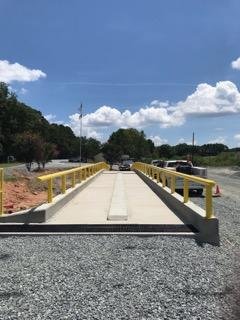Truck scales are essential equipment used in various industries to accurately measure the weight of loaded vehicles. They play a crucial role in ensuring compliance with weight regulations, optimizing logistical operations, and facilitating fair trade.
When it comes to truck scale construction, there are two common options, concrete deck scales and steel deck scales. While both serve the same purpose, they differ significantly in terms of material composition, structural characteristics, and overall performance.
In this article, we will explore and compare the features, benefits, and drawbacks of concrete deck truck scales and steel deck truck scales to help you make an informed decision.
Material Composition
Concrete Deck Truck Scales:
Concrete deck truck scales are primarily constructed using reinforced concrete slabs supported by a series of steel beams. The deck surface is typically made of high-quality concrete with steel rods or fibers to enhance its structural integrity. The concrete deck offers excellent durability, corrosion resistance, and can withstand heavy loads.
Steel Deck Truck Scales:
Steel deck truck scales, as the name suggests, are built using steel components throughout the scale structure, including the deck itself. Steel deck scales usually consist of steel I-beams or U-shaped beams that form the main support structure. The deck surface is composed of steel plates or grating, offering exceptional strength and rigidity.
Strength and Durability
Concrete Deck Truck Scales:
Concrete deck scales are renowned for their exceptional strength and durability. Concrete is a material that can withstand heavy loads and offers resistance to wear and tear over extended periods. Additionally, concrete decks provide a stable weighing surface, reducing the potential for movement or flexing during weighing operations. They are less prone to damage from impacts, such as dropped loads or accidental collisions with vehicles.
Steel Deck Truck Scales:
Steel deck scales are also highly durable and can withstand heavy loads. Steel's inherent strength makes it capable of handling dynamic loads and impact forces more effectively than concrete. However, steel decks may be more susceptible to corrosion and rust, especially in harsh environments or when exposed to corrosive substances. Regular maintenance, such as applying protective coatings, can help mitigate these issues.
Installation and Maintenance
Concrete Deck Truck Scales:
Concrete deck scales generally require more time and effort during the installation process compared to their steel counterparts. Constructing a concrete deck scale involves pouring and curing concrete, which can take several days or weeks depending on the scale's size. However, once installed, concrete deck scales typically require minimal maintenance beyond routine cleaning and inspections.
Steel Deck Truck Scales:
Steel deck scales offer a faster and more straightforward installation process compared to concrete deck scales. Steel components can be prefabricated off-site, reducing the installation time significantly. However, steel deck scales may require more maintenance in the long run. Periodic inspections for corrosion, surface damage, and proper calibration are necessary to ensure accurate weighing results and extend the scale's lifespan.
Flexibility and Portability
Concrete Deck Truck Scales:
Concrete deck scales are typically designed as permanent installations. Once installed, they are challenging to relocate due to their heavy concrete construction. However, their immobility provides stability and reduces the risk of inaccuracies caused by movement. Concrete deck scales are suitable for facilities that have a fixed weighing location and do not require frequent scale repositioning.
Steel Deck Truck Scales:
Steel deck scales offer greater flexibility and portability compared to concrete deck scales. They are often designed with modular components, allowing for easy disassembly, relocation, or expansion. This flexibility is particularly useful for industries with changing operational requirements or temporary weighing stations. Portable steel deck scales can be easily transported to different locations and set up quickly.
Cost Considerations
Concrete Deck Truck Scales:
Concrete deck scales typically have higher upfront costs due to the materials and labor involved in their construction. The need for skilled concrete workers and the longer installation time contribute to the overall expenses. However, concrete deck scales offer excellent long-term value due to their durability and lower maintenance requirements.
Steel Deck Truck Scales:
Steel deck scales generally have lower upfront costs compared to concrete deck scales. The prefabricated steel components and faster installation process contribute to these cost advantages. However, it's important to consider the potential additional expenses associated with ongoing maintenance, especially in corrosive environments.
Conclusion
Concrete deck truck scales and steel deck truck scales each offer distinct advantages and considerations. Concrete deck scales provide exceptional durability and stability, making them ideal for permanent installations with minimal maintenance requirements. Steel deck scales, on the other hand, offer flexibility, portability, and cost advantages, allowing for easy relocation and scalability.
When deciding between the two, factors such as the intended usage, budget, environmental conditions, and future operational needs should be carefully evaluated. Consulting with industry experts or scale manufacturers can also provide valuable insights tailored to your specific requirements. By considering these factors, you can make an informed decision and select the truck scale that best suits your business needs.


